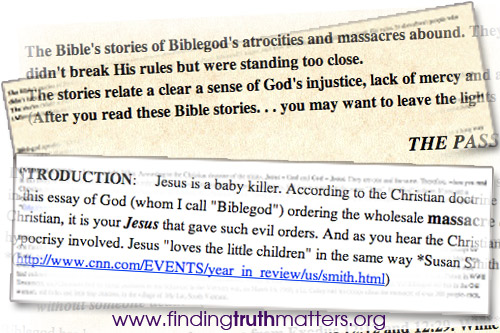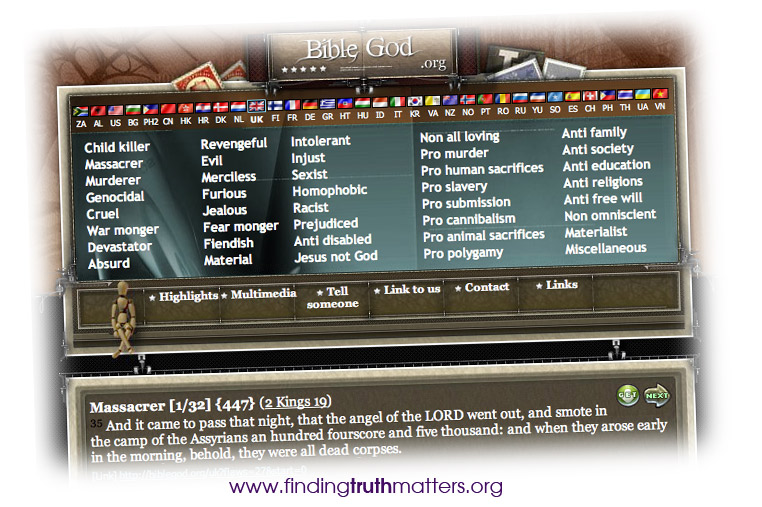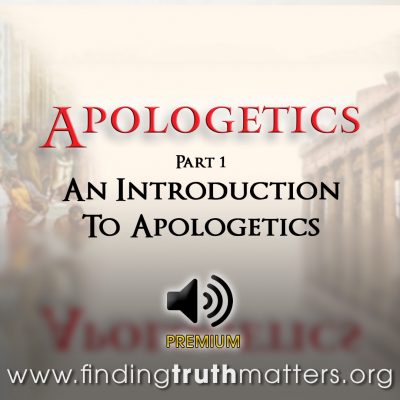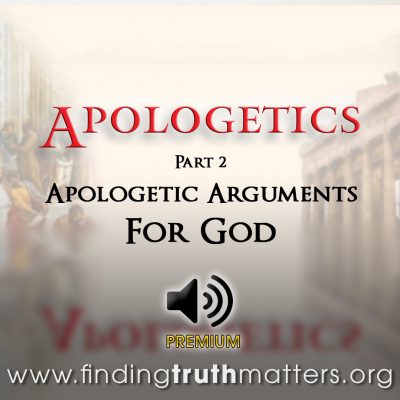home > articles > Is The God of The Bible Worth Knowing

Is the God of the Bible worth knowing? Christians claim that He is a loving, kind, and gracious God. But others who have read the Bible see a different description for God. They see the God of the Bible as mean, violent, abusive, cruel, and unfair. The God of the Bible is vicious God who is simply not worth knowing, they cry. There probably is a God- but the Bible is not the revelation of that God, they claim. At stake is-
(1) The entire credibility of Christianity,
(2) The validity of the Bible as the Inerrant/Inspired/Unique Revelation from God, and
(3) (Potentially) God’s reputation.
This is therefore not just an issue for apologists like myself to answer, but a critical issue for every Christian to be able to reasonably respond to. This involves establishing whether there is evidence apart from the Bible which supports the claims of the Bible about God and then synthesising this data to form a character sketch of the true God.
IS THERE SCIENTIFIC EVIDENCE FOR GOD?
“all attempts to reconcile faith with science and reason are consigned to failure and ridicule.”
Christopher Hitchens, “God Is Not Great – How Religion Poisons Everything”
We know that the universe came into existence at an event commonly called the “Big Bang”. Astrophysicist and Cosmologist, Dr Hugh Ross, writes in his book, Why The Universe Is The Way It Is, that the Big Bang was the cosmic creation event (not its cause) which marked the beginning of space, time, energy and matter. It is illogical to conclude that the Big Bang was either uncaused or that it caused itself. The historicity of the Big Bang also makes any notion of a “Cyclic Universe” (the idea that the Universe has had multiple births and rebirths) impossible. Thus, the Big Bang has significant theological implications.
“From a scientific standpoint, the discovery that the universe had a beginning was a remarkable achievement.”
Dr Hugh Ross (Astronomer & Cosmologist), “Why The Universe Is The Way It Is“, Baker Books, 2008, page 128
Lately some hyper-naturalists (those who refuse to countenance anything supernatural) have purported to have evidence from the sub-atomic (Quantum) level that something can come from nothing. This assertion is based on “sub-atomic vacuum fluctuations” where it appears at the sub-atomic level that particles come into existence from nothing. But this has now been shown not to be the case. Rather, as Einstein had speculated, at the sub-atomic, the Special Law of Relativity (that Light travels at a constant speed anywhere in the universe) may not apply. Einstein theorised a name for these sub-atomic particles: tachyons. In effect he imagined that it was possible for these tachyons to appear to come out of nowhere within an atom because they are moving faster than the speed of light! Einstein’s speculations were verified by British scientists in the 1980s. Added to this is the discovery that a vacuum within an atom is not “nothing”- rather it is energy.
The argument that something can come from nothing, based on observations at the sub-atomic level (Quantum Physics) has now been shown to be without a basis – even at the sub-atomic level particles are caused.
The same idea applies to space. It used to be considered nothing, a vacuum. But astronomers have discovered that it is actually energy called dark energy . Beyond dark energy there is another form of energy called exotic dark matter. It is not nothing. It is a completely unsatisfactory explanation to claim that all space, time, matter and energy came into existence from nothing. And because science has verified beyond reasonable doubt that there was a cosmic creation event (called The Big Bang) it is similarly unsatisfactory to claim that the universe (space, energy, time and matter) has always existed- that is, that it had no beginning. This idea comes under the banner of abiogenesis (a-bio-genesis = “a” no, “bio” life, “genesis” beginning) or “no beginning”.
In his Doctoral Dissertation, Dr William Lane Craig presents- The Kalam Cosmological Argument. The premise to the syllogism is grounded in the historicity of Big Bang Cosmology. Astronomers observe the expansion of the Universe and can measure the Cosmic Microwave Background Radiation (“WMAP”, Wilkinson Microwave Anisotropy Probe) which both confirm the Big Bang event. The Kalam Cosmological can be put simply as –
Everything which had a beginning had a cause.
The Universe had a beginning.
Therefore, the Universe was caused.
The next line of this logical syllogism could rightfully continue-
This first cause must be uncaused.
SO WHAT?
The “so what” becomes obvious: The Big Bang requires a Big Banger! This Big Banger must have already existed outside of what the resulted from the Big Bang. Thus, the Big Banger is outside of time, space, energy and matter. This demands a First Cause who is (i) timeless, (ii) not limited to the space dimension, (iii) not limited to the constraints of natural energy, and (iv) not limited to the constraints of matter. This means that the Big Banger must be eternal, omni-present, almighty, and an immaterial spirit. But we observe more from the universe about the nature of the Big Banger.
From Cosmology we observe that there must have been an Uncaused First Cause who created the Universe. From Astronomy we see that the one who was this Uncaused First Cause has created an optimised universe for advanced life on earth, and that the observable creation is information-rich. Even in the “simplest” life forms, there is a mind-boggling amount of information. In other words, one of the hallmarks of what we observe in biology is that the originator of all life is a linguist! The essence of life is summed up in a language called DNA. It was the head of the Human Genome Project, Dr. Francis Collins, who went on to write the book, The Language of God, in which he points out the highly sophisticated language involved in the human genome. But DNA is not just about linguistics, it’s the result of a potentially infinitely intelligent person.
 It was a challenging question from a biology student to the now Emeritus Professor of Evolutionary Biology at UCLA, Dean Kenyon, which caused him to renounce Darwinian Evolution’s tacit idea that life originally came from non-life. The student asked whether the first life form wrote its own DNA. This simple question caused an entire theory, which Prof. Kenyon had written a University level textbook for, to unravel. Kenyon knew that it was impossible for a life form to assemble without the DNA assembly instructions.
It was a challenging question from a biology student to the now Emeritus Professor of Evolutionary Biology at UCLA, Dean Kenyon, which caused him to renounce Darwinian Evolution’s tacit idea that life originally came from non-life. The student asked whether the first life form wrote its own DNA. This simple question caused an entire theory, which Prof. Kenyon had written a University level textbook for, to unravel. Kenyon knew that it was impossible for a life form to assemble without the DNA assembly instructions.
If it could be demonstrated that any complex organ existed, which could not possibly have been formed by numerous, successive, slight modifications, my theory would absolutely break down. But I can find out no such case.
Charles Darwin, The Origin of Species: A Facsimile of the First Edition, Harvard University Press, 1964, p. 189
Darwin knew nothing of genetics let alone DNA. If Charles Darwin could have seen what Professor Dean Kenyan saw, he would have realised that his theory fails at the macro level. Even if a person refuses to accept supernatural idea that God is the Creator of all matter, time, space and energy, they are still left with the problem that random, unordered, undirected events do not leave all the tell-tale signs of personality and intelligence as exhibited in the elegant design of the cosmos or the smallest living cell. One of the world’s leading proponents of String Theory, Professor Brian Greene, suggests that the universe is so well ordered that there must have been a Grand Organising Designer (G.O.D.) behind it all.
Thus, the record of nature (science) points to the God described in the Bible. But does history?
IS THERE EVIDENCE FROM HISTORY THAT THERE MUST BE A GOD?
The origin (Abraham), birth (Exodus from Egypt), and establishment (under King David and Solomon) of the ancient nation of Israel validates the claim that God has intervened in human history. But by far the most dramatic attestation of God intervening into human history was Jesus Christ. In historical terms, Jesus Christ lived fairly recently in human history. His existence is not credibly denied by historians. His existence is verified by several contemporary historians as well as those who were His followers. His birth, activity, death and resurrection can only be explained in supernatural terms.
Lately, some critics have tried to morph the historical Jesus into a legendary Jesus by claiming that the stories that circulated about Jesus were influenced by existing legend stories, such as the virgin-birth and resurrection of Mithros. But upon further investigation it becomes apparent such virgin-birth+resurrection stories appeared centuries after Jesus Christ!
The history of the life of Christ was written during the lifetimes of his original audience. That is, those who recorded the life of Christ wrote to an audience who could either verify or refute the facts of these accounts. Several of the New Testament authors write with this in mind. Luke opens his Gospel account by noting that eye-witnesses to the life of Christ were still available and that many accounts of Christ’s life were already circulating. Paul, the apostle, states in First Corinthians 15 that the resurrected Christ was witnessed by more than 500 people at one time –
Then he appeared to more than five hundred brothers at one time, most of whom are still alive, though some have fallen asleep.
First Corinthians 15:6
Some have tried to undermine the historical credibility of the New Testament accounts by claiming that the Gospels were not written until the second or even third centuries. But this claim is not taken seriously by either theologians or historians. One of the major reasons for this is the sheer number of first century accounts which quote these Gospels and perhaps the most obvious reason to believe that all of the New Testament books were written before 70AD is the lack of discussion about the fulfilment of Christ’s prophecies regarding the destruction of Jerusalem (prophesied in Matthew 24 and Luke 21). It would be like writing the history of New York and not mentioning September 11! Add to this that if someone claiming to be prophet had detailed – 40 years earlier – the exact circumstances in which September 11 was to have taken place… we then have some idea of the potential significance to the New Testament writers of what happened in between 66AD and 70AD during the siege and destruction of Jerusalem! For the first century Jew, the claims of Christ that the Temple would ever be destroyed let alone taken apart brick by brick, was preposterous. But when it happened in the three and half year siege and destruction of Jerusalem (66AD – 70AD) the words of the Christ were precisely, remarkably, and wonderfully fulfilled. The New Testament writers had an inspired inkling of something divine and cataclysmic about to happen and referred to their day in reference to the Temple Age as “the end of the ages” (1Cor. 10:11; Hebrews 9:26), “last days” (Acts 2:17; 2Tim. 3:1; Heb. 1:2; James 5:3).

These are some of the reasons why we regard the New Testament documents as having been completed by AD 70. This means that eye-witnesses to the events they describe would have been able to refute its claims or accuse the New Testament writers of flagrant deception- but no such accusations occurred. This adds credibility to the claim that the Bible is reliable. And what it reliably reports is that God became flesh, revealed the heart of God through His teaching and miracles, was crucified, resurrected and translated directly to heaven.
Thus, history also points to the identity of God being the God of the Bible. But is the God of the Old Covenant the same as the God described in the New Testament?
IS THE GOD OF THE OLD TESTAMENT THE SAME AS THE GOD OF THE NEW TESTAMENT?
The claim of the New Testament is that God is loving, kind, merciful, and compassionate.
…you have seen the purpose of the Lord, how the Lord is compassionate and merciful.
James 5:11
 But the overall impression from the Old Testament about God is that He is hateful, unforgiving, intolerant and unrelenting in His thirst for blood. After all, they continue to claim, this “Bible-God” orders the death of innocent people, the slaughter of unsuspecting women and children, and the stoning of children who stray from the faith. Added to this is the unmitigated gall of this “Bible-God” to command that His subjects love Him! But it gets worse- this “Bible-God” condemns those who don’t believe in Him to HELL for ETERNITY! This “Bible-God” who claims to be a God of justice is prepared to commit the greatest injustice of all time- condemning people who made moral mistakes over just a few years to hell for an endless eternity! How unjust!
But the overall impression from the Old Testament about God is that He is hateful, unforgiving, intolerant and unrelenting in His thirst for blood. After all, they continue to claim, this “Bible-God” orders the death of innocent people, the slaughter of unsuspecting women and children, and the stoning of children who stray from the faith. Added to this is the unmitigated gall of this “Bible-God” to command that His subjects love Him! But it gets worse- this “Bible-God” condemns those who don’t believe in Him to HELL for ETERNITY! This “Bible-God” who claims to be a God of justice is prepared to commit the greatest injustice of all time- condemning people who made moral mistakes over just a few years to hell for an endless eternity! How unjust!
Perhaps the God described in the Old Testament, who we intuitively suspect is a God of infinite love and compassion, is not the real God?
I have read the Old Testament of the Bible through dozens of times. My Theological specialty is New Testament Hermeneutics, in which I am a lecturer, I have however written extensively on the Old Testament and it’s particular books. I have also preached several series based on Old Testament books. I mention this not to validate my credentials for making comments about the Old Testament, but to make a simple observation: In all my readings and study of the Old Testament I have never met this “Bible-God”. When I hear the criticisms of the God of the Bible as a cruel, unjust, vindictive God, I suspect that these critics are committing some literature errors: (i) taking verses of the Old Testament in isolation rather than in the context in which they occur. For example, one such critic was an Australian Senator who launched a harsh attack on Christianity by claiming that the “Bible-God” was unjustly and gratuitously violent. As an example, she cited Bible verses which seemed to endorse the divine sanction of heinous war-crimes such as the ripping open of pregnant women.
Samaria shall bear her guilt,
because she has rebelled against her God;
they shall fall by the sword;
their little ones shall be dashed in pieces,
and their pregnant women ripped open.
Hosea 13:16
¶ Thus says the LORD:
“For three transgressions of the Ammonites,
and for four, I will not revoke the punishment,
because they have ripped open pregnant women in Gilead,
that they might enlarge their border.
Amos 1:13
But when read these references in context we immediately realise that God is speaking through these prophets to condemn these acts! In neither passage is God commanding or even remotely endorsing these war-crimes!
Critics of the Old Testament God (“Bible-God”) object to the references where capital punishment is prescribed for seemingly religious crimes. For example, for violating the Sabbath by gathering sticks (for a fire), the prescribed punishment was death by stoning.
And those who found him gathering sticks brought him to Moses and Aaron and to all the congregation. They put him in custody, because it had not been made clear what should be done to him. And the LORD said to Moses, “The man shall be put to death; all the congregation shall stone him with stones outside the camp.”
Numbers 15:33-35
 On the surface of it, this appears cruel and unjustified. But there’s more to this passage. Firstly, if God randomly and arbitrarily condemned people to death it would be difficult to view Him as anything other than a celestial megalomaniac. Secondly, God as Creator has the intrinsic right to set the rules for every facet of life. Plato wondered why it was that certain moral standards were universally known. In his Socratic discussion, Plato asks, Do the gods love justice because it is just? Or, is it just because the gods love it?
On the surface of it, this appears cruel and unjustified. But there’s more to this passage. Firstly, if God randomly and arbitrarily condemned people to death it would be difficult to view Him as anything other than a celestial megalomaniac. Secondly, God as Creator has the intrinsic right to set the rules for every facet of life. Plato wondered why it was that certain moral standards were universally known. In his Socratic discussion, Plato asks, Do the gods love justice because it is just? Or, is it just because the gods love it?
But the Bible presents another view of God’s morality: morality is either right or wrong because it is either a reflection or a distortion of God’s character. That is, our ultimate source for right and wrong behaviour (‘morality’) is God Himself. There is not a Law decreed by God that He Himself does not keep or reflect. In fact, it seems that God thinks that Law-giving is not only His right, but His unique prerogative!
But there is a spiritually genetic malfunction within each human being that causes us to resent anyone telling us what to do. Yet, we all recognise injustice when we see it. Like the Judge deciding a case about whether a picture was either pornography or art, who said, “I don’t know how to define it, but I know it when I see it.” We all seem to have basically the same inbuilt moral compass that helps us to recognise right and wrong when we see it. We all prize the same moral virtues of love, courage, and self-sacrifice. The Bible’s claim is that we are all created in the image of God and bear His moral stamp upon our soul. Because of this we intuitively know that God is loving, kind and merciful. This is the clear picture of God presented in the New Testament. “For God so loved the world…” (John 3:16) “God is love.” (1John 4:8) “…He might show the immeasurable riches of his grace in kindness toward us…” (Eph. 2:7) “…the goodness and loving kindness of God our Saviour appeared…” (Titus 3:4) and so on. But is this talking about the same God described in the Old Testament who ordered killing and violence? The apparent contrast between the God of the Old Testament and the God of the New Testament has caused some to conclude that either God had an about face, or the Bible is describing two Gods!
However, both of these conclusions are not supported by the New Testament. In fact, several of the New Testament references I have cited about God’s compassion, love and kindness are actually quotations from the Old Testament!
The LORD passed before him and proclaimed, “The LORD, the LORD, a God merciful and gracious, slow to anger, and abounding in steadfast love and faithfulness”
Exodus 34:6
Those who denounce the God of the Bible as the cruel, vicious and a capricious “Biblegod”, acknowledge that the true God must be good, kind and benevolent. Those Biblical references to God ordering violence can only therefore be a false representation of the true God, they assert. But one of the problems these proponents have in supporting their claims is their authority for making such claims – how do they know which passages in the Bible accurately describe God and which ones do not?
 Atheists, like Christopher Hitchens and Richard Dawkins, have made similar refutations of the God of the Bible as a vicious and bloodthirsty deity. But one wonders whether this is not atheism shooting itself in the foot because if on the one hand they deny God exists but on the other hand have a clear picture of what this God looks like, they are no longer arguing like atheists. Despite this irony, (similar to the objection made by some atheists about the existence of God with the question- Who made God? which is also not an objection to God’s existence but rather an acknowledgement of it!) Christopher Hitchens agrees that the New Testament God is indeed the same as the Old Testament God, and Jesus Christ is a ghastly tormenter-
Atheists, like Christopher Hitchens and Richard Dawkins, have made similar refutations of the God of the Bible as a vicious and bloodthirsty deity. But one wonders whether this is not atheism shooting itself in the foot because if on the one hand they deny God exists but on the other hand have a clear picture of what this God looks like, they are no longer arguing like atheists. Despite this irony, (similar to the objection made by some atheists about the existence of God with the question- Who made God? which is also not an objection to God’s existence but rather an acknowledgement of it!) Christopher Hitchens agrees that the New Testament God is indeed the same as the Old Testament God, and Jesus Christ is a ghastly tormenter-
“This distinction [between the Old Testament and the New with respect to an ill-tempered god] is more apparent than real, since it is only in the reported observations of Jesus that we find any mention of hell and eternal punishment…Not until the advent of the Prince of Peace do we hear of the ghastly idea of further punishing and torturing of the dead.”
Christopher Hitchens, “God Is Not Great…”, p.175-176
Therefore, even proponents of the idea that the God of the Old Testament is a nasty God seem to regard the God referred to in the New Testament as the same God. Indeed, this is clearly the claim of the New Testament itself.
IS THE GOD OF THE BIBLE CRUEL AND EVIL?
Unlike other religious books which condone religious killings, the Bible is very restrictive in its advocating of military action. Acts of war were heavily regulated in the Bible. This included –
-
Opportunities for surrender (to avoid any bloodshed) [Deut. 20:10-11]
-
Protection for non-combatant women and children and even livestock [Deut. 20:14]
-
Acceptance of defectors (e.g. Rahab)
-
Preservation of prisoners (e.g. Gibeonites)
Two things should be noted though. In many of these ancient civilisations, armies were not standing armies in the modern sense. They were more like a reserve army where men, women, and children (not necessarily very young children) were engaged in military conflict. In some of the conquest passages of the Old Testament (a limited period occurring early in Israel’s history where military aggression was promoted against a specific enemy) there are commands for all the enemy combatants to be executed failing their surrender. This included instructions to execute “women and children”. In other instances we find the Old Testament, narrating what actually happened during a war even though we have no record of what they did ever being prescribed by God.
There are of course those references in the Old Testament where God Himself slays people. But upon further investigation this was not done capriciously or randomly. Far from it! The usually pattern is one of instruction – rebellion – warning – rejection – punishment. In every instance of God’s wrath there is divine mercy preceding but divine mercy rejected by the rebellious. God never slew the innocent! And God never slew the innocent without warning and an offer of His mercy leading to repentance.
In the New Testament, there is certainly a clearer picture of what the eternal consequences of rejecting God involves. Christopher Hitchens is right to say that Jesus spoke about Hell. But it is not correct that Jesus was a blood-thirsty megalomaniac because He believed in and preached about eternal judgment. The idea of Hell is emotionally difficult, but there is no credible denying that it is taught in the New Testament. Does this make God a vicious God? It might do if He never warned mankind about it and clearly provided the way of avoiding it. But God has provided a warning about Hell and He most gloriously provided a way of escaping it. Some prefer to interpret “Hell” as temporary torment followed by annihilation. But to invalidate someone’s choice (which is what God would be doing if He annihilated a soul) is not an act of love – even if the consequences are eternal.
Thus, the assertion that God is cruel, murderous, and even evil, is not the testimony of Scripture. “Biblegod”, as these asserters derisively contend, is not an accurate interpretation of the Sacred Text. Rather, the God of the Bible, who does indeed demand obedience, moral purity, love, and compassion toward each other, is a God of limitless love, mercy and compassion toward those who humbly seek Him. Certainly the Old Testament shows us that God considers our eternal destiny of such great worth that we should take every measure to ensure that we are at peace with Him. This is the same God that is confirmed by the testimony of cosmology (the Universe had a beginning initiated by a Beginner), philosophy (He is the Uncaused First Cause), history (the record of Jesus Christ’s life) and He is the same God who is revealed in the New Testament.
It is the claim of Hebrews 1 that Jesus Christ was the exact representation of God. This claim is made by Christ Himself in the Gospel of John (“if you’ve seen me you’ve seen the Father“). It’s hard to read the Gospels and not meet a Jesus who is infinitely caring and loving and full of compassion. Jesus goes on to say that the essence of what life is really all about is summed up in this invitation : know God, and Jesus Christ whom God sent (John 17:3). It was the immediate testimony of Christ’s followers that He was knowable, and wholly worth knowing. It has been the testimony of converts down through the centuries ever since Christ walked the shores of Galilee and healed the sick, raised the dead, cleansed lepers and forgave sins, that Christ can be known and is indeed most worth knowing. It is the humble affirmation of this author, whose life has been eternally changed by Jesus Christ’s magnificence, that He is indeed worth knowing. It is also this author’s prayer that you may indeed come to know the God of the Bible.
Dr. Andrew Corbett
February 24th 2010, writing from Legana, Tasmania.
3 Comments
Submit a Comment
-
Sale!

5 Things We Need To Do To Break Our Church’s 200 Barrier, Premium Audio
Original price was: $1.75.$0.95Current price is: $0.95. -
Sale!

A Morning With Izaak Walton – The Compleat Man, Premium Audio
Original price was: $1.75.$1.25Current price is: $1.25. -
Sale!

Apologetics Part 1 – Introduction To Apologetics, Premium Audio
Original price was: $1.75.$0.95Current price is: $0.95. -
Sale!

Apologetics Part 2 – The Apologetic Arguments For God, Premium Audio
Original price was: $1.75.$0.95Current price is: $0.95.









































You are still ignoring the fact that God created us sinners, made us condemned to hell by design as punishment for being born, still doesn’t adequately warn people about hell (even the most hell-worshipping fundamentalist cannot understand how horrible God made it to be,) has put the only escape to the doom he created us for in the hands of a bunch of open and proud hypocrites (the church) and their bloody crusades to spread this ultimatum of hate and death,
and worse still, you’re ignoring the fact that just because people have consciences does not mean that deciding that your version of God created the conscience gives him the license to hide behind technicalities and semantics to justify ethnic cleansing, especially when it is that very god who has caused all sin by foreordainance in causing us to be born sinners in the first place.
Gordon, thank you for your comment. While I understand what you’re saying, I do not think you are accurate. Firstly because God created the first humans as free moral agents, they were not created as “sinners”. Secondly, no one is created so that they can go to hell – on the contrary – God gives everyone an opportunity to receive His forgiveness and accept His offer of eternal adoption. But I do agree with you that if someone claims to be a Christian and lives a blatantly hypocritical life they are not really a Christian. I’m not sure which Christian group has ever launched a campaign of “ethic-cleansing” in the Name of Jesus, but if they had, your intuition that this was wrong and against what Christ taught is spot on — because Jesus taught exactly the opposite.
– Dr. Andrew Corbett
You were not created a free agent. You were dead in your sins until you were made alive in Christ. You had no ability to be a not-sinner. You had no choice but to sin, unless you believe that Pelagius was right. According to Romans 9, God does not create some people for heaven.
According to 10, it’s clearly written that God does NOT give everyone an opportunity to hear. Everybody outside of the Jewish nation before Christ is damned for lawlessness per Romans 1-3.
If blatant hypocrites are not Christian, than all Christians who sin aren’t Christisns either. If God can exact eternal torture for being morally imperfect, then I can condemn all of Christianity as depraved monsters when one of you sins.
Jesus did not teach against ethnic cleansing. He declared that not one iota of the law would be broken down, and that includes the orders to cleanse the holy land of canaanite ethnicity. God did not abolish slavery; he modified it.